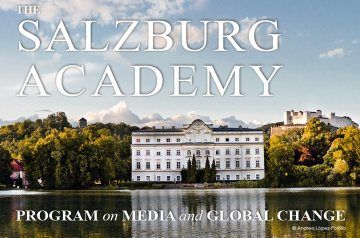Salzburg Academy to Host Free Online Workshops on Protest, Pandemic, Power
![Black Lives Matter Protest in Montreal, Canada on June 7, 2020. [Photo/Ying Ge via Upsplash]](https://today.emerson.edu/wp-content/uploads/2020/09/ying-ge-wr0R2mhgoRs-unsplash-1-1-1024x683.jpg)
By Molly Loughman
How have global protests and a global pandemic altered our lives? What media initiatives and narratives are impactful? What media are harmful to public health and safety, and in what ways?
Instead of gathering Emersonians and mediamakers from around the world in Austria this year, the Salzburg Academy on Media & Global Change will answer these crucial and timely questions by hosting a series of free and public virtual workshops this fall, beginning with Protest, Pandemic & Power: Media Literacies, Storytelling and Global Futures on September 24.
“The academy is designed to bring together aspiring journalists, storytellers, and mediamakers from across the world to form networks to respond to the largest problems we face in societies and communities and to use media to do so,” says the Salzburg Academy’s program director, Paul Mihailidis, who is also Emerson’s assistant dean of the School of Communication and associate professor/graduate program director for Media Design. “We look at these workshops as a chance to be present with each other, connect and share stories, and build momentum and network.

The Salzburg Academy on Media & Global Change is normally an intensive three-week research and action summer program, uniting young media makers from around the world to critique and create civic media for social change. Unable to physically gather this summer due to COVID-19, Salzburg Academic is offering a different mode of engagement.
Bringing together Academy alumni; partner institutions; and stakeholders in media, education, policy, journalism, and beyond, Protest, Pandemic & Power: Media Literacies, Storytelling and Global Futures will feature female journalists who are working in Germany, Argentina, and in the U.S. On Thursday, September 24, speakers in the first interactive free/public virtual workshop will share how the coronavirus pandemic and widespread protests for social justice are reshaping their lives, communities, media, civic life, and future prospects. At the end, participants will outline noted opportunities and constraints.
“The more diverse voices we can bring together, the more powerful the experience is,” says Mihailidis. “The Academy is also built on the idea that oppression exists structurally and literally across all communities — whether you’re in a democratic country, a developed nation, or whether you’re in a transitioning country or a nondemocratic nation. We use the media to solve those problems.”
Mihailidis will moderate the September 24 event, alongside Megan Fromm, a journalism instructor, Salzburg Academy curriculum director, and current Educational Initiatives Director for the Journalism Education Association in Colorado.
“We’re going to try to maximize the presence of our community — faculty, students and researchers — around the work together,” says Mihailidis. “We’ve designed timely media workshops with voices from all over the world sharing their experiences in real time. We’re making the virtual workshops public to welcome larger community, geographies and people who haven’t been able to be a part of the academy in the past years. The nature of Salzburg Media Academy is it’s immersive and experiential, and that’s the value of it.”
Thursday, Oct. 22
Thursday, Nov. 19
About Salzburg Media Academy
The pivot with this year’s virtual program is to bridge to 2021 when the Salzburg Academy on Media and Global Change hopes to reconnect in-person as a cohort.
The academy builds on digital literacies and engagement around critical challenges for society. Normally, its annual three-week program connects young media innovators across disciplines to produce multimedia tools and reframe curricula and research. Founded in 2007, the program has over a thousand alumni and faculty from 72 countries and 60 participating institutions worldwide.
While collaborating to advance digital literacies and engagement around issues of modern society, students normally live and work in the Schloss Leopoldskron, the palace made famous by Julie Andrews’ film The Sound of Music — an unforgettably beautiful setting in rural Austria. The program includes excursions to Munich and Vienna, and into the Alps.
Partner Institutions: Media for Change, University of Miami, Center for Excellence in Media Practice (CEMP), Bournemouth University, Institute of Media Research and Training, Lebanese American University, International Center for Media & Public Agenda (ICMPA), University of Maryland, Salzburg Global Seminar American Studies Program, Engagement Lab, Emerson College, DocuLab, Iberoamericana University, Media Education Lab, University of Rhode Island, Civic Paths, University of Southern California, National Association for Media Literacy Education (NAMLE), and the Center for Media & Information Literacy, Temple University.
Categories